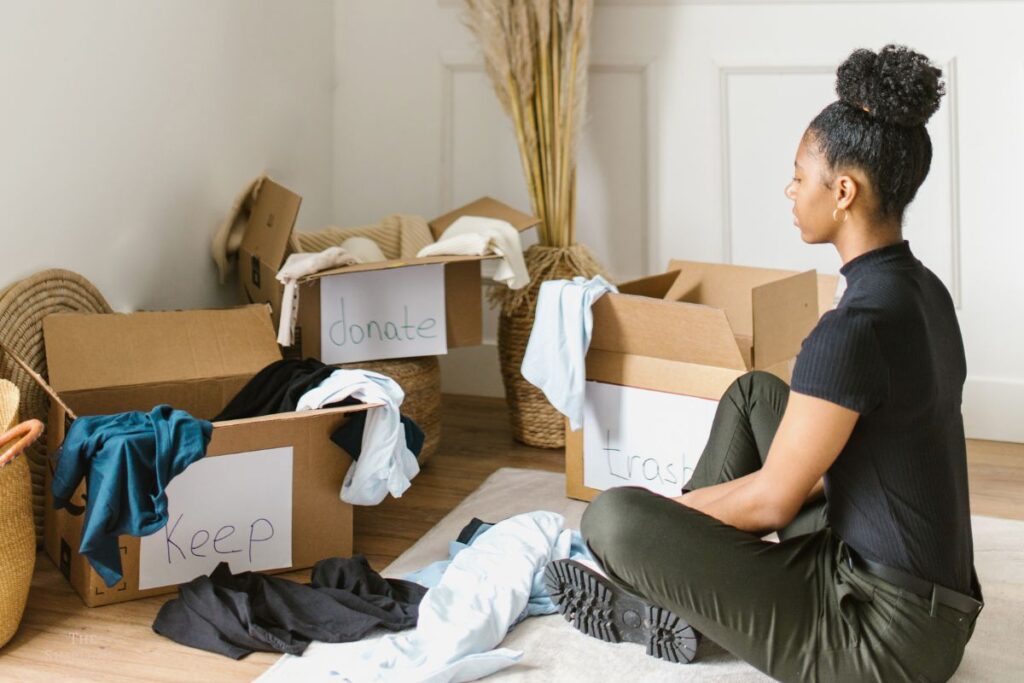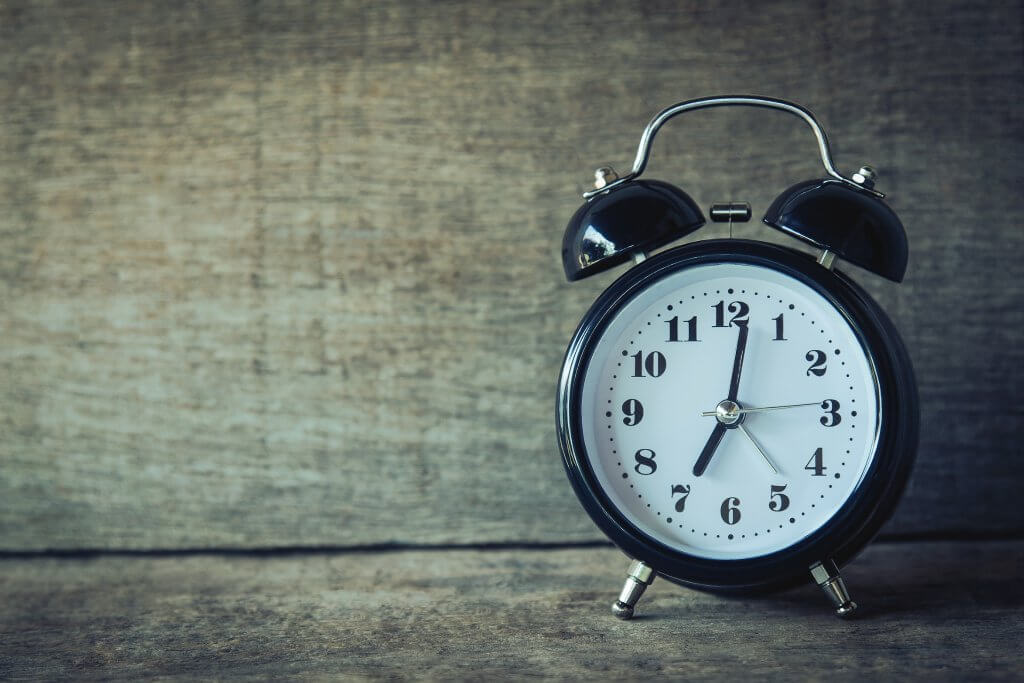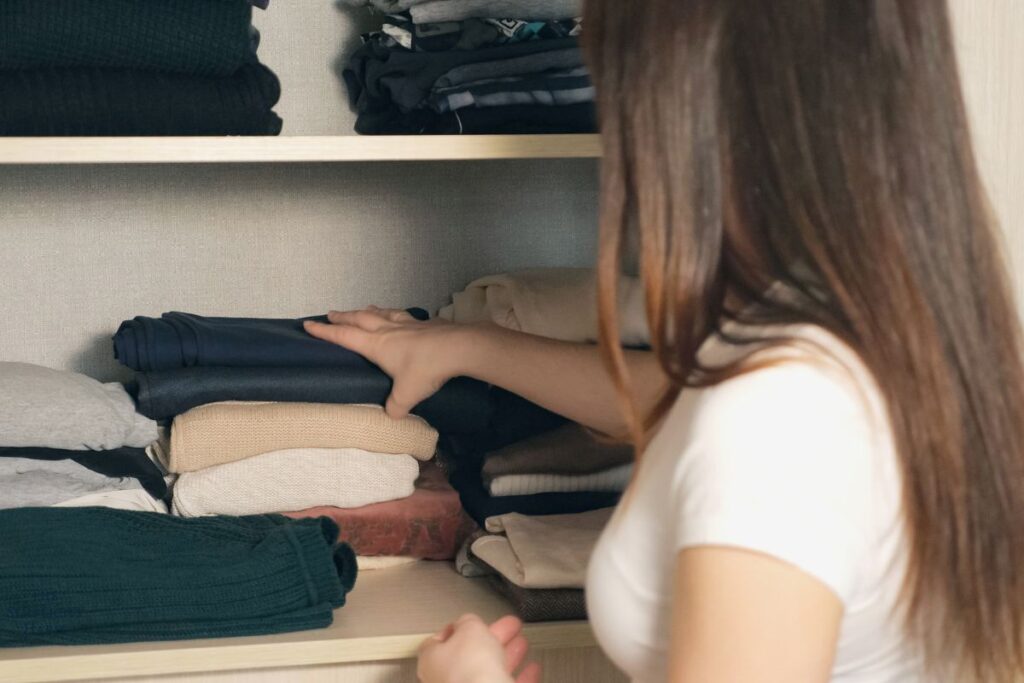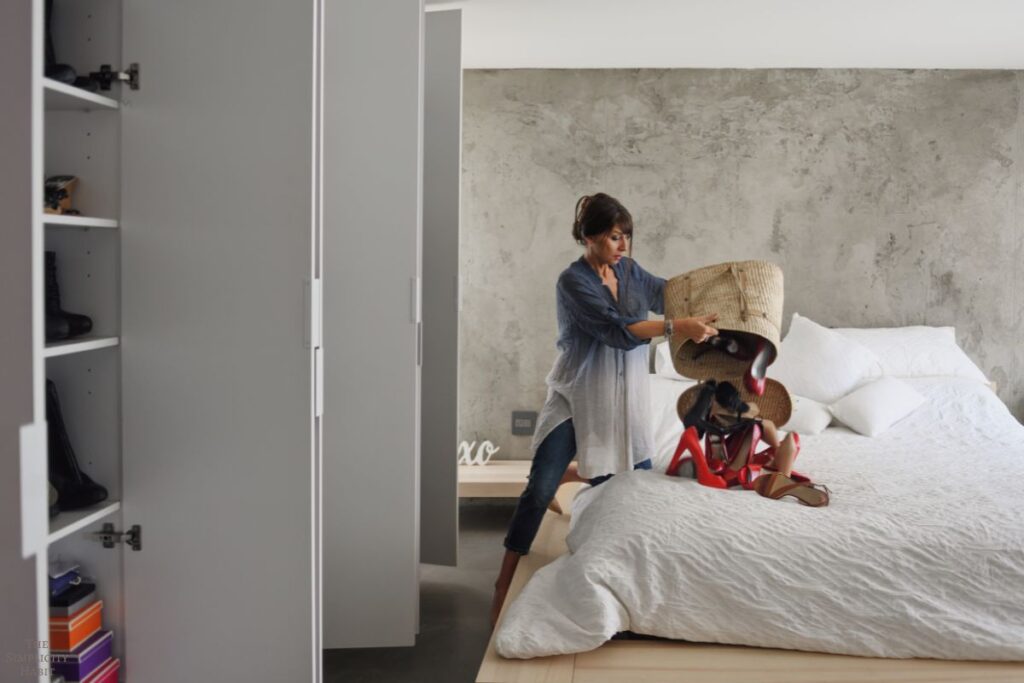Inside: When you’re decluttering, it’s easy to get stuck in the messy middle. Use these important decluttering reminders to help you get back on track and make more progress.
Have you started decluttering your home only to find yourself unmotivated or distracted midway through your progress?
Or maybe you’re having trouble taking the first step to get started because it just feels overwhelming.
In either situation, it’s beneficial to reflect on these important decluttering reminders. They’ll shift your perspective and bring clarity to your simplifying goals.
When you remember what you are working toward and why, it can help you to get back on track and move forward once again.
Keep reading for the important decluttering reminders for when your progress has stalled and you need some additional motivation to keep going.

Important Decluttering Reminders When Your Progress Stalls
Getting started is one of the biggest challenges with decluttering. But even once you get past how to start decluttering your home, it takes motivation and determination to continue working on it.
Use these eight important decluttering reminders to help get you back on track and give you the additional push you need to make more progress.
1. People are not their things.
If you’ve inherited formerly beloved treasures from family members who have passed it’s not uncommon to have difficulty letting them go.
However, when those items become a burden or you become known as the family historian on who everyone begins to dump their unwanted items, it’s important to remember that people are not their things. And letting go of items that belonged to them doesn’t lessen your love for them or the impact they had on your life.
Your memories can live on without having to be weighed down by other people’s stuff. You can declutter sentimental items while holding onto your precious memories.
“Be the things you loved most about the people who are gone.” -Unknown

2. It will cost you time now or later.
If you struggle with procrastinating, you may be telling yourself that you can just get back to decluttering later. But then tomorrow becomes the next day and the next.
Meanwhile, more stuff continues to accumulate, and finding things becomes increasingly challenging. Did you know that Americans spend an average total of 2.5 days a year looking for misplaced stuff? And the more stuff you have the more difficult it becomes to find lost things.
By setting aside the time now to declutter your home you’ll save more time (and less stress!) in the long run. Getting ready in the morning is faster after you’ve simplified your stuff and items are easily accessible.
“The greatest amount of wasted time is time not getting started.” -Dawson Trotman
3. Someone else has to deal with your things if you don’t.
A big motivator for many who want to declutter their home is that they don’t want their kids to have to sort through everything after they’re gone. This is often people who had to deal with tons of things after their own parents passed.
While most everyone will have some personal belongings that need to be dealt with after death, the amount of things left behind is a huge variable depending on where the person lived, how much stuff they’d accumulated, and whether or not they tried to minimize any of it when they were still here.
In some cases, people hold onto those things thinking other family members will want them after they’re gone. But that is rarely the case for the majority of it.
In a time of loss and grief, families are left with the added stress of having to sort through a lifetime’s worth of things. The reminder that someone has to deal with your things if you don’t can serve as a wake-up call.
Go through your things now and sort through who you want to have what. Consider gifting some of them now. Find people who will continue to love and appreciate the things you’ve treasured.
“You can always hope and wait for someone to want something in your home, but you cannot wait forever, and sometimes you must just give cherished things away with the wish that they end up with someone who will create new memories of their own.” -Margareta Magnusson

4. You can move past the reasons you’ve been holding onto it.
There are some common reasons that people tend to hold onto clutter. A few of them include lamenting the money that was spent, worrying that you’ll regret letting something go, and feeling guilty about getting rid of it.
Understanding why you’ve been holding onto things is the first step toward releasing them. Working through your thoughts and feelings will help you to see what lies you’ve been telling yourself so you can replace them with what’s really true.
Clutter typically isn’t just about the stuff, but rather the beliefs behind what you own. Only through sorting out and challenging those core beliefs can you make lasting changes in your home and life.
“Remember that the money you spent on your item is gone. You are not any richer because you store this item in your home, and you won’t be poorer if you let it go.” -Cassandra Aarssen
5. Each item you purchase represents hours spent working.
As you continue to simplify your home, it’s important to also slow the flow of things coming into your space in order to maintain your progress.
To be more intentional with shopping, calculate how many hours you would have to work to pay for the item that you want. This exercise causes you to carefully consider whether that thing is worth the time you’d have to work to pay for it.
Decluttering helps to shift your perspective on what you bring into your home. By facing past purchasing regrets and adopting habits that make you more cautious in the future, you can keep clutter at bay and save more money in the process.
“The price of anything is the amount of life you exchange for it.” -Henry David Thoreau

6. Everything you bring into your home costs you.
In addition to the things in your home costing money when you purchase them, they continue to cost you after you’ve brought them home.
Each item takes time to clean, maintain, organize, and later pack when you move.
Having fewer things makes organizing significantly easier. When you have less stuff it takes less time to clean. This is a really helpful reminder if you’re like me and struggle to get motivated to clean your home.
If you’ve moved recently you know that everything you own costs you additional time, energy, and money when you relocate. Thinking ahead and proactively simplifying your things now will save you time and money.
“The things you own end up owning you.” -Chuck Palahniuk
7. Putting off decluttering prevents you from enjoying the benefits.
When you consider the benefits of decluttering that you could be experiencing it serves as the most important reminder of why to continue with the process.
The effort you put in is more than worth it when you see the results of your work. In addition to saving time and money as was mentioned earlier, you’ll also have the benefit of feeling more relaxed as you’re able to more fully enjoy your home.
Having more energy and undivided attention for the things that matter most to you is priceless. There is a lot more fulfillment to be found in making more memories rather than amassing additional stuff.
“Outer order contributes to inner calm.” -Gretchen Rubin

8. It’s just stuff.
One of the biggest challenges to decluttering is that we’ve made stuff more important than it should be. The stuff becomes tied to our identity and our emotional attachment overrides our rational thoughts.
In case you need to hear these truths, I want to remind you that…
Your space is more important than your stuff.
Your peace is more important than your stuff.
And your relationships are more important than your stuff.
Fear often drives people to hang onto more than they need. Once you begin to untangle your thoughts and feelings, you can start to see your stuff for what it is.
This is the starting point that will help you to declutter your fantasy self and embrace your life now. Your value and worth are not found in the things that you own. You get to choose the meaning that you assign to your stuff.
No one gets to take anything with them when they die. You don’t have to continue being weighed down by stuff. Experience the freedom of living with less by choosing to let go of the excess now.
“Remember that when you leave this earth, you can take with you nothing that you have received-only what you have given.” -Francis of Assisi
Which of the important decluttering reminders is your favorite? Share it in the comments section below.
Sign up on the form below to get weekly decluttering tips and inspiration sent straight to your inbox. You’ll also get the free 5 Areas to Declutter in 10 Minutes Checklist to help you get started decluttering today.


It’s just stuff! I’m living in my sister’s house as her primary care giver. My brother in-law passed nine months ago and the decluttering conversation is exhausting.
All of them! but probably 1 and 3 resonate most as having just lost ederly parents (2 days apart) and now dealing with their estate, there is a lot of “Stuff”. Some of it is worth holding onto for sentimental reasons but a lot is just Stuff.
I added these to my “Nuggets of Wisdom” file:
NUGGETS OF WISDOM
Someone else has to deal with your things if you don’t. Swedish Death Cleaning
“Remember that the money you spent on your item is gone. You are not any richer because you store this item in your home, and you won’t be poorer if you let it go.” -Cassandra Aarssen
“Be the things you loved most about the people who are gone.” -Unknown
People are not their things.
It’s just Stuff!!
Great article. Like the information that is provided for
clutter issues and help. Surprising that there are so many details in one website. Thank you.
no 7.
and all the quotations.
The quote from St. Francis is profound.–Anne
One source of my clutter is the older family members whose stuff came to me after we decluttered their legacy of clutter. I come from a long line of pack rats. When my GM died at 93 she still had my father’s 3rd grade leaf collection. (To be fair, he was an only child.)
For 26 years I was the primary caregiver for my handicapped son. He went home to Jesus in 2012. I did give away most of his things because I wanted people to use them. His red riding helmet is still being used at the therapeutic riding center where he rode for more than 15 years. However, I still have some silly things that have visceral meaning to me – the plaster molds for Matthew’s lower leg braces, the teddy bear print single bed sheets, some of his stuffed teddy bears, a few of his toys. They are not clutter.
Clutter is junk mail, political literature, paperbacks I’ll never read again, dishes I never use, papers I should file, papers I should organize, mail I haven’t opened because I know they are please for money, bills I thought I put on electronic billing.
really love the ggpas 3rd grade leaf collection.
Great article! Thank you. 🙂
“Be the things you loved most about the people who are gone.”
Really love this quote and there is freedom and peace in doing this.
Now, to do it.
I think it’s important to communicate with adult children about the things they might want. It might be a difficult conversation but in the long run will help them not to feel the burden later on.
It’s just stuff. I find myself chanting it.
The money is already gone. You can get a little bk if it’s something someone else will use. But don’t hold out if you can’t get your price. The point is to let it go.
My kids don’t want our stuff for the most part. There may be a few treasures but that’s it. W/sentimental items I ask before I let them go. For the most part, let go, it’s freeing!
I came on this article thru Lawrence Hutera, (actor, singer, zen psychologist). thanks to Lawrence and his website.